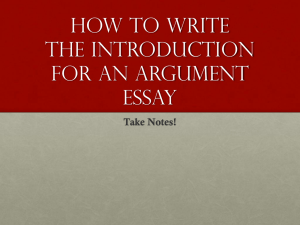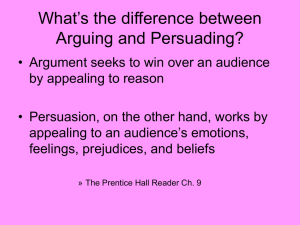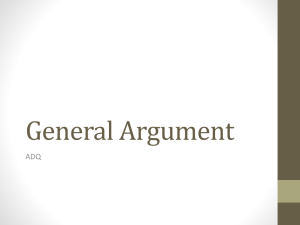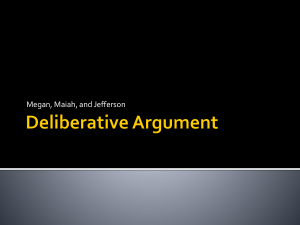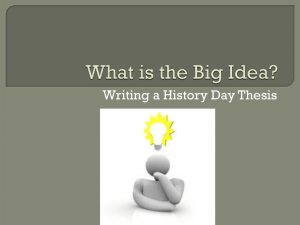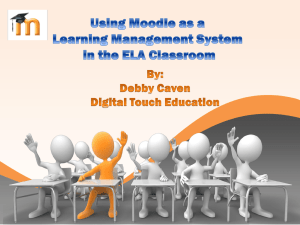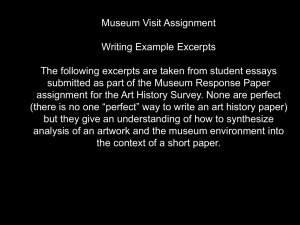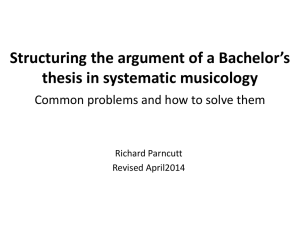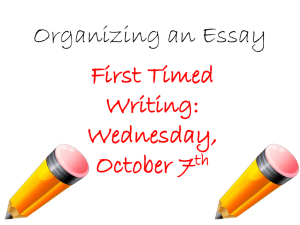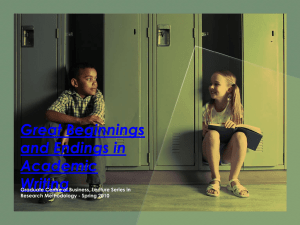Prompt #1 Feedback
advertisement
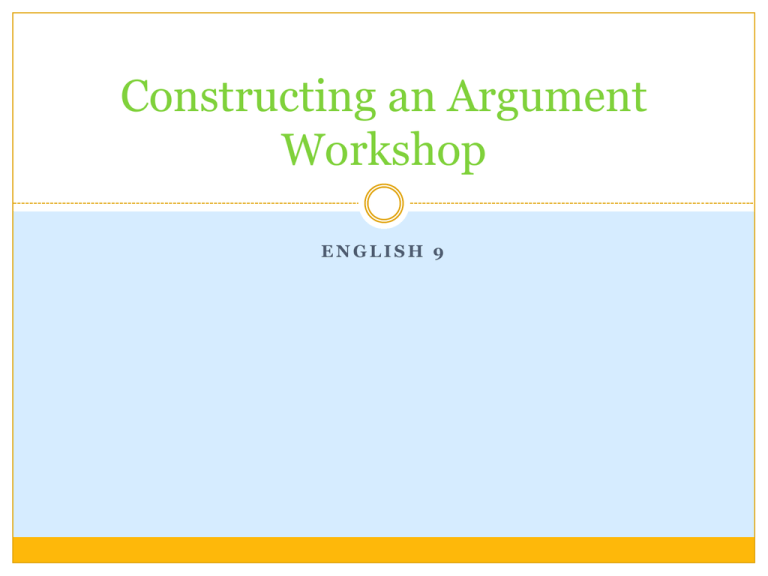
Constructing an Argument Workshop ENGLISH 9 Two types of prompts Literary Analysis Purpose – to analyze Uses direct quotations from the text as evidence Usually done for process pieces Argument Purpose –to convince Does not use direct quotations May use personal experience, observations, etc. as support Will be used for first best drafts/on-demand writing prompts Tips for Reading the Prompt Read the prompt carefully Decide what it is asking you to do Be sure to address ALL parameters of the prompt Common prompt words: DEFEND - argument “for” REFUTE - argument “against” QUALIFY – shows both sides of the argument; “common ground” Thesis Creation After reading the prompt, create a thesis FIRST! Argument essays refer to this as a CLAIM If the prompt asks you DEFEND, REFUTE or QUALIFY, choose one and create your claim. Be sure your thesis includes topic, direction and at least two divisions (elements of support). The thesis should be complex, as it is supposed to express complex ideas. Be sure that it comes at the end of your Intro paragraph. Thesis Statements The last sentence of your introduction should be the thesis statement. All thesis statements should contain the following: 1. TOPIC—what the essay is about 2. DIRECTION—how the essay will be organized Ex-literary analysis, compare/contrast, cause/effect (this is determined through use of transition words) Defense, Refutation, Qualification 3. DIVISIONS—the elements of support/reasons why you agree or disagree Sample Argument Prompt: Mahatma Gandhi once said, “You don’t know who is important to you until you actually lose them.” In a well-organized response, defend, refute, or qualify the above statement regarding love and loss. Use evidence from “A Christmas Memory” and/or observations/personal experience to support your position. Brainstorm Possible Divisions: Defend: Refute: Qualify: Sample Thesis Statement Some people understand and appreciate the impact that others have on their lives in the present moment while others often times take for granted these significant people and do not recognize their influence until it is too late. TOPIC—the impact people have on our lives DIRECTION— qualification of quote (shows both sides) DIVISIONS— 1. argue “against” (body 1) 2. argue “for” (body 2) How to Construct and Argument Introduction: The writer tries to win the attention of the audience by introducing the subject/problem. Statement of Background: The writer tells how this specific topic has impacted him/her. Proposition: This is where you state your thesis/claim. How to Construct an Argument Proof: The writer offers detailed support/evidence to support the claim. Must have two detailed pieces of evidence that support your divisions Refutation: The writer recognizes and refutes opposing claims or evidence. Conclusion: The writer summarizes the claim and moves the audience/reader’s to take action. Introduction People tend to take the most important things in life for granted on a daily basis. For example, a beautiful sunset, a walk of the beach, a heart-to-heart talk with a close friend, or advice from a parent are just a few of the things that can have the biggest impact in a person’s life Statement of Background Throughout my own personal experience, I have taken the most important people and events for granted but have learned as the years go by to always cherish these important moments in the present as these are moments that we never get back. Proposition/Thesis Some people understand and appreciate the impact that others have on their lives in the present moment while others often times take for granted these significant people and do not recognize their influence until it is too late. Proof--#1 First and foremost, I have been lucky enough to have a very strong bond with my mother. When I was younger, I often took her and our bond for granted. I always just assumed that she would live forever and be around to give me constant guidance. As I grow older, I have learned that nothing and no one lasts forever; life as we know it can be altered at any given moment, so it is crucial to appreciate and cherish these bonds. For me, I cherish every day and every experience that I have with my parents. For example, taking family vacations and having Sunday dinners together are just two of the ways that I have learned to spend quality time with my mother. These are the moments that we never get back. Proof--#2 In “A Christmas Memory” Buddy forms a very strong bond with his elderly relative. Because he is only a seven-year-old boy at the time, he does not fully realize the impact that his friend has on his life during these years. It is not until much later in his life that Buddy understands the imprint that his cousin left on him. Even though Buddy has lost his friend on this earth, he is able to relive the memories that were most important. Gandhi once said, “You don’t who is important to you until you lose them.” For Buddy, this was certainly true. While it is too late to appreciate these moments in the present, Buddy regains “the irreplaceable part of himself,” his friend, through the memories of kitemaking and fruitcakes. Refutation—recognizing the other side Some are too young to understand the importance of cherishing significant people and events while we have them. Sure, there are those unique individuals that are wise beyond his/her years and never take things for granted. However, the majority of people only realize a person’s impact once he or she is gone. Conclusion Ultimately, in life there are precious moments. These are moments that we never get back. It is important to always cherish these moments and the people that make them memorable. Always make time for the things and people that matter most because, like Buddy, one day we will only be left with the memories. Stylistic Components Avoid the 1st (I, me, my, us, we, ours) and 2nd (you) person in formal writing. Use the 3rd person (readers, people, him/her, others) No contractions: do not instead of don’t Try not to start sentences like this: “This shows that…” Vary your sentence structure Be conscious of possession and agreement Word choice counts
